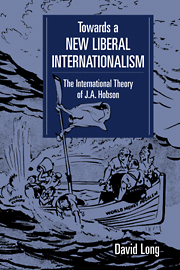Book contents
- Frontmatter
- Contents
- Acknowledgements
- 1 Introduction
- 2 Rationality, welfare and the organic analogy
- 3 Co-operation, the surplus and the theory of underconsumption
- 4 An evolutionary framework for international relations
- 5 The domestic determinants of an imperialistic foreign policy
- 6 The international relations of imperialism
- 7 Economic internationalism, free trade and international government
- 8 International government and the maintenance of peace
- 9 J. A. Hobson and liberal internationalism
- Notes
- Bibliography
- Index
- LSE MONOGRAPHS IN INTERNATIONAL STUDIES
8 - International government and the maintenance of peace
Published online by Cambridge University Press: 12 September 2009
- Frontmatter
- Contents
- Acknowledgements
- 1 Introduction
- 2 Rationality, welfare and the organic analogy
- 3 Co-operation, the surplus and the theory of underconsumption
- 4 An evolutionary framework for international relations
- 5 The domestic determinants of an imperialistic foreign policy
- 6 The international relations of imperialism
- 7 Economic internationalism, free trade and international government
- 8 International government and the maintenance of peace
- 9 J. A. Hobson and liberal internationalism
- Notes
- Bibliography
- Index
- LSE MONOGRAPHS IN INTERNATIONAL STUDIES
Summary
International government as the rational organisation of international relations appears to be a logical extension of Hobson's new liberalism, specifically his theory of co-operative surplus and his organic analogy. In fact, however, Hobson's most detailed proposal for international government appeared during and as a reaction to the First World War rather than any growth in international co-operation. In Towards International Government and the Union of Democratic Control pamphlet, A League of Nations, Hobson addressed the questions of international peace, security and order, and suggested international government as an alternative to the balance-of-power system which, he believed, had been a major cause of the First World War.
Hobson hoped that his proposals would fulfil three requirements for international peace: the consolidation, extension and addition of sanction to international law, the establishment of a method of just and peaceful settlement, and the reinforcement of methods for constructive co-operation. He argued that peace could only be achieved by centralising force to strengthen international law and methods of peaceful resolution of international conflicts. Hobson justified his ideas on centralised force through an appeal to the surplus and organic concepts. His discussion of international government as the culmination of the growth of international institutions and his broader proposals for an international federation are also couched in terms of these concepts.
- Type
- Chapter
- Information
- Towards a New Liberal InternationalismThe International Theory of J. A. Hobson, pp. 144 - 172Publisher: Cambridge University PressPrint publication year: 1995

